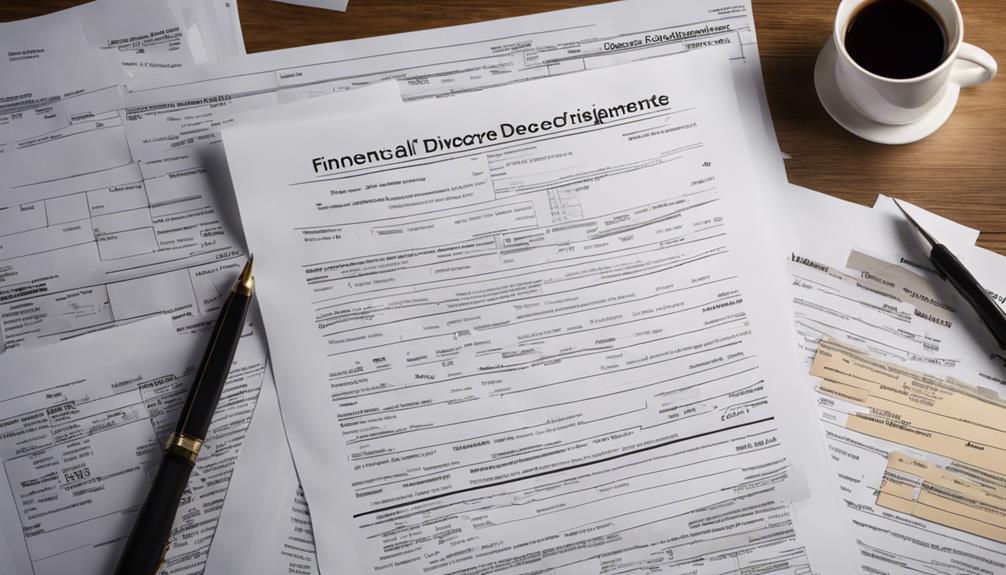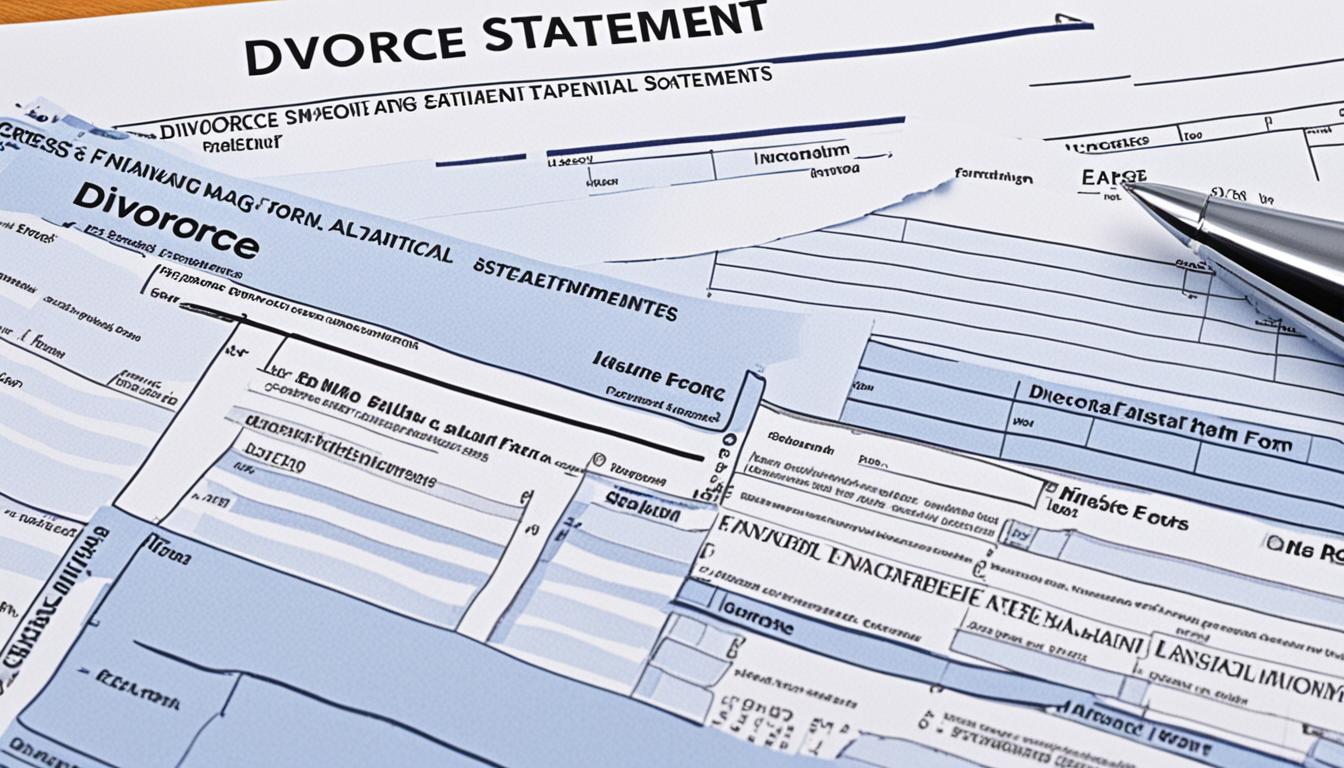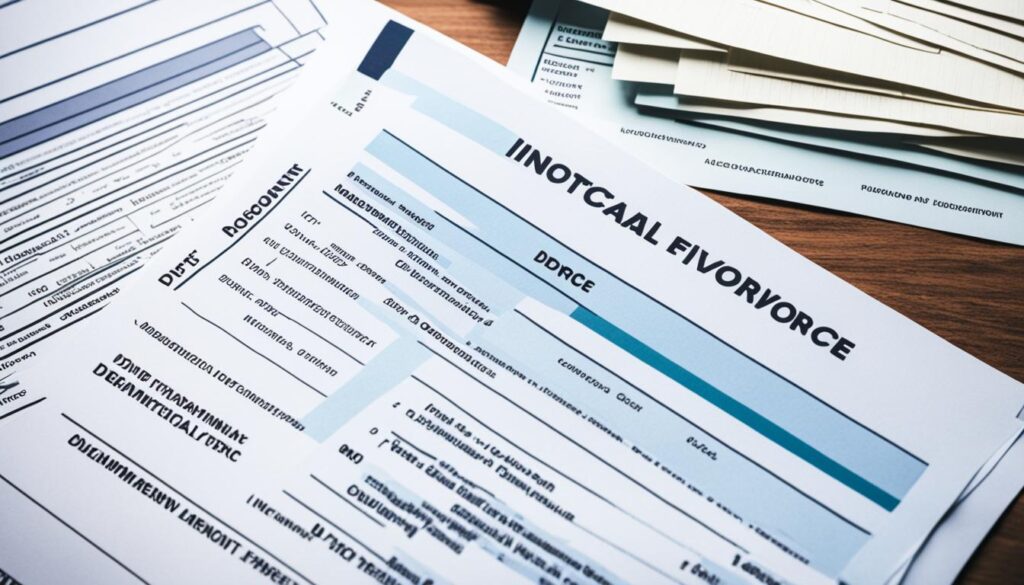Financial Planning and Budgeting
What Are California's Divorce Financial Disclosure Requirements?
Wade through the layers of California's divorce financial disclosures to unravel the intricate web of assets and debts that shape divorce settlements.

Deciphering the financial disclosure requirements for divorce in California is like peeling back the layers of an onion, revealing the intricate financial groundwork that underpins the end of a marriage. By detailing assets and debts, as well as outlining income and expenses, these requirements have a substantial impact on the eventual outcome of divorce agreements.
Understanding the nuances of these financial disclosures is key to ensuring a fair and equitable resolution. So, what exactly do these requirements entail, and how do they impact the divorce process?
Key Takeaways
- Timely preliminary financial disclosures within 60 days are crucial in California divorces.
- Mandatory forms like FL-140, FL-150, FL-142, and FL-141 ensure full financial transparency.
- Incomplete disclosures can lead to legal consequences and financial penalties.
- Transparent financial reporting is essential for fair settlements and court decisions.
Disclosure Deadline in California Divorce
When filing for divorce in California, meeting the 60-day deadline for submitting preliminary financial disclosures is a crucial step in the legal process. Both parties must share all relevant financial information by completing the required forms. Failure to disclose financial documents timely can result in delays and affect the fairness of settlements.
The Declaration of Disclosure form must be filed with the court and served on the other party within the specified timeframe. This document includes details of assets, debts, income, and expenses. Providing accurate and comprehensive financial disclosures is essential for transparency and ensuring that both parties have a clear understanding of the financial landscape in the divorce proceedings.
It's imperative to adhere to the disclosure deadline to facilitate a smoother divorce process and avoid potential complications down the line. By sharing the necessary financial information promptly, the divorce proceedings can progress efficiently and fairly.
Required Financial Documents in Divorce

In a California divorce, the required financial documents play a crucial role in ensuring full transparency and compliance with state laws. These documents, including the Declaration of Disclosure (form FL-140), Income and Expense Declaration (form FL-150), Schedule of Assets (form FL-142), and Proof of Service (form FL-141), are essential components of divorce financial disclosure. The Declaration of Disclosure mandates each party to provide comprehensive information about their financial status, assets, and debts. The Income and Expense Declaration requires a detailed breakdown of income sources, expenses, and financial obligations. The Schedule of Assets is crucial for listing all assets, their values, and any separate or community property distinctions. Proof of Service is necessary to confirm that the financial documents have been exchanged between the parties. By adhering to these requirements, individuals ensure compliance with California divorce laws and maintain the necessary level of financial transparency throughout the divorce process.
| Required Financial Documents | Form Number |
|---|---|
| Declaration of Disclosure | FL-140 |
| Income and Expense Declaration | FL-150 |
| Schedule of Assets | FL-142 |
| Proof of Service | FL-141 |
Completing Mandatory Disclosure Forms
To ensure compliance with California divorce laws and facilitate fair settlements, completing the mandatory disclosure forms is imperative for both parties involved in the divorce proceedings.
The Declaration of Disclosure, including forms such as the Income and Expense Declaration (FL-150) and the Asset Declaration (FL-142), is essential for achieving financial transparency. These forms require a comprehensive disclosure of each party's financial status, ensuring that all relevant information is provided for a fair division of assets and liabilities.
Additionally, completing the Proof of Service form (FL-141) is crucial to demonstrate that the necessary documents have been properly served to the other party. By adhering to these requirements and providing accurate and complete forms, both parties contribute to the integrity of the financial disclosure process, ultimately leading to more equitable divorce settlements.
It's essential to carefully complete these forms to avoid delays or complications in the divorce proceedings.
Consequences of Incomplete Disclosures

Inadequate financial disclosures during divorce proceedings can result in severe legal consequences, including contempt of court and monetary sanctions for non-disclosure or provision of false information.
In California divorce cases, failure to fully disclose financial information can lead to contempt of court charges if the non-disclosure is willful or intentional. Monetary sanctions may be imposed to cover the other party's attorney fees incurred in discovering the incomplete disclosures. Additionally, the court may award assets to the other spouse as a penalty for the incomplete disclosures.
If hidden assets or lies are uncovered post-divorce, agreements may be set aside, leading to further legal complications and financial repercussions. Moreover, the effects of delayed proceedings, loss of trust, and increased legal fees due to dishonesty can exacerbate the already stressful divorce process. Therefore, ensuring complete and transparent financial disclosures is crucial in California divorce proceedings to avoid these serious consequences.
Importance of Transparent Financial Reporting
Transparent financial reporting in California divorce cases is essential to uphold the integrity of the legal process and ensure equitable outcomes for all parties involved. Full disclosure of assets, debts, income, and expenses is mandated by California law to guarantee a fair resolution.
By providing accurate and transparent financial information, parties enable the court to make informed decisions based on all relevant factors. Failure to adhere to these reporting requirements can impede the court's ability to achieve equitable outcomes, potentially leading to unjust results.
Honesty and accuracy in financial disclosure not only promote fairness but also enhance transparency throughout the divorce process. Therefore, it's imperative for individuals involved in California divorce proceedings to prioritize complete and precise financial reporting to facilitate a just and equitable resolution of their marital affairs.
Compliance with these requirements is fundamental to maintaining the integrity of the legal system and fostering trust among all parties involved.
Frequently Asked Questions
Is Financial Disclosure Required for Divorce in California?
Yes, financial disclosure is required for divorce in California. It ensures fair outcomes in matters like child support and property division. Full transparency is mandated by law for equitable decisions. Lack of disclosure impedes informed judgments.
What Are the Final Disclosures for Divorce in California?
We ensure final disclosures in California divorce by completing forms FL-140, FL-150, and FL-142. It's crucial to serve form FL-141 for proof. These disclosures guarantee full financial transparency, a vital step before finalizing divorce proceedings and ensuring equitable outcomes.
Is California a Mandatory Disclosure State?
Yes, California is a mandatory disclosure state, requiring parties in a divorce to provide detailed financial information. Failure to disclose can result in penalties. Full financial transparency is essential for fair divorce settlements.
What Assets Are Protected in Divorce in California?
In California, assets acquired before marriage, received as gifts or inheritances during marriage, or designated as separate property are safeguarded in divorce. Community property, usually earned during marriage, is subject to division.
Conclusion
In conclusion, adhering to California's divorce financial disclosure requirements is crucial for a fair and transparent legal process. Failing to disclose financial information can lead to penalties and complications in property division and support decisions. Just as each piece of a puzzle fits together to form a complete picture, accurate and timely financial disclosure forms the foundation for a smooth and equitable divorce settlement.
Transparency is key in navigating the complexities of divorce proceedings in California.
Understanding the financial implications of divorce can be daunting. Christopher, our Financial Strategist, makes it accessible and manageable. He offers strategic insights into financial planning, asset division, and budgeting during and after divorce. Christopher’s guidance is invaluable for anyone looking to navigate the financial challenges of divorce with confidence and clarity.
Financial Planning and Budgeting
Divorce Financial Statement Guide: How to Fill Out

Did you know that accurately filling out a financial statement is crucial for reaching a fair and just agreement in a divorce? Mistakes or inaccuracies could result in serious consequences, including fines and damage to your reputation.
After filing for divorce, one of the important tasks is filling out a financial statement. This document provides the court with an overview of your income, expenses, and assets. It is crucial to be honest and thorough while filling out the financial statement, as any omissions or misrepresentations can have serious consequences, including penalties and damage to your credibility. The form may vary depending on your location, but the purpose remains the same – to give the court an accurate snapshot of your financial situation. It is essential to gather supporting documentation, such as tax returns, pay stubs, financial statements, and bills, to verify the information you provide.
Key Takeaways:
- Accurately filling out a financial statement is crucial for a fair and equitable divorce settlement.
- Mistakes or misrepresentations in the financial statement can lead to penalties and damage to your credibility.
- Gather supporting documentation to verify the information provided in the financial statement.
- Be honest and thorough while filling out the financial statement to provide an accurate snapshot of your financial situation.
- The financial statement helps the court make decisions regarding support, property division, and attorney fees.
Why is the Financial Statement Important in Divorce?
The financial statement plays a crucial role in the divorce process as it is used by the court to make decisions regarding spousal support, child support, attorney fees, and property division. It provides a comprehensive overview of your financial situation and helps the judge assess your ability to pay or receive support.
Considered a sworn statement under penalty of perjury, any deliberate misrepresentations can lead to penalties or even legal consequences. Accurate and detailed information in the financial statement is vital for a fair and equitable divorce settlement.
By providing a clear picture of your income, expenses, and assets, the financial statement assists the court in determining appropriate support payments, dividing marital property, and ensuring that the financial needs of both parties and any children involved are met.
The financial statement is like a financial snapshot of your life during the divorce process. It is an essential document that provides transparency and allows the court to make informed decisions based on your financial situation.” – Family Law Attorney, Jane Wilson
With the financial statement serving as a key factor in divorce proceedings, it is crucial to be diligent and accurate while filling it out. Providing misleading or incomplete information can lead to unfair outcomes and damage your credibility in the eyes of the court.
Next, we will explore the specific documentation required for the financial statement to ensure a comprehensive and accurate representation of your financial situation.
Key Points
| Financial Statement in Divorce | Importance |
|---|---|
| Used by the court to make decisions | To assess ability to pay/receive support |
| Sworn statement under penalty of perjury | Deliberate misrepresentation can lead to penalties |
| Provides a comprehensive financial snapshot | Aids in fair and equitable settlement |
| Key factor in determining support payments and property division | Ensures financial needs are met |
Now that you understand the importance of the Financial Statement in Divorce, let’s delve into the specific documentation required to support your financial disclosures.

What Documentation is Required for the Financial Statement?
To accurately fill out a financial statement, you will need to gather various documents that support your income, expenses, and assets. Providing accurate and up-to-date documentation is crucial to back up the information you include in your financial statement.
Some common documents required for the financial statement include:
- Tax returns for the previous years: These help provide a comprehensive view of your income and deductions.
- Pay stubs: These documents show your regular income and any additional earnings.
- Financial statements from bank accounts, credit cards, and retirement accounts: These statements offer an overview of your assets and liabilities.
- Real estate information: Documenting property ownership and any mortgages or loans connected to it is essential.
- Loan details: If you have any outstanding loans, such as a car loan or student loan, gather relevant information about those debts.
- Bills: Collect bills for utilities, insurance, childcare, and other regular expenses to accurately represent your monthly financial obligations.
Gathering these documents ensures that you have the necessary evidence to support the figures you provide in your financial statement.

Having all the necessary documentation ready will help you accurately complete your financial statement and present an accurate representation of your financial situation to the court.
Tips for Filling Out the Financial Statement
Filling out the financial statement can be a complex task, but following some tips can make the process smoother.
- Calculate your income carefully: Include all sources of income and average variable income over a specific period. This ensures that you provide an accurate representation of your financial situation.
- Thoroughly document your expenses: Include all necessary categories and be detailed in recording your expenses. Additionally, utilize averages for expenses that are incurred irregularly to provide a comprehensive overview.
- Gather supporting documentation: It is crucial to gather all appropriate documentation to support the information you provide in your financial statement. This includes tax returns, pay stubs, financial statements, and bills. Having this documentation ready will help verify the accuracy of the information you provide.
- Avoid double-dipping: Ensure that you list your expenses only once. Double-dipping can lead to inaccuracies and misrepresentations, which may have consequences during the divorce proceedings.
- Designate separate property accurately: If you have separate property that is not subject to division, make sure to accurately designate it in your financial statement. Provide all necessary attachments or documentation to support the separate property claim.
If you have any questions or need assistance in completing the financial statement accurately, it is advisable to seek guidance from your attorney. They can provide you with the necessary expertise and ensure that you navigate the process effectively.

Image: Illustration of a person organizing financial documents for a financial statement.
Understanding the Categories in the Financial Statement
The financial statement is a comprehensive document that provides an overview of your financial situation during divorce proceedings. It is divided into various categories, each representing different aspects of your financial life. Understanding these categories and accurately filling them out is essential to present a complete picture to the court.
Here are the key categories typically included in a financial statement:
1. Personal Information
This section includes basic personal details such as your name, address, contact information, and social security number.
2. Gross Weekly Income from All Sources
Here, you need to list all sources of income including wages, self-employment income, rental income, dividends, and any other form of regular income.
3. Itemized Deductions from Gross Income
In this category, you should list all allowable deductions such as federal and state taxes, healthcare costs, retirement contributions, and any other deductions that reduce your gross income.
4. Adjusted Net Weekly Income
This section calculates your adjusted net weekly income by subtracting the itemized deductions from your gross weekly income. It represents your disposable income after deducting allowable expenses.
5. Other Deductions from Salary
If you have any additional deductions such as union dues, health insurance premiums, or other mandated payments, this is where you would list them.
6. Net Weekly Income
This category represents your net weekly income after deducting both itemized deductions from gross income and other deductions from salary.
7. Gross Yearly Income from the Prior Year
Here, you need to provide your total gross income from the previous year, including any bonuses, commissions, or other forms of income received during that period.
8. Weekly Expenses
This section requires you to list your weekly expenses, including housing costs, utilities, transportation expenses, healthcare costs, childcare expenses, and any other regular living expenses.
9. Assets
Include all your assets in this category, such as real estate, vehicles, investments, bank accounts, retirement accounts, and any other valuable possessions.
10. Liabilities
Here, you should list all your liabilities, including mortgages, loans, credit card debts, and any other outstanding debts or obligations you have.
By accurately providing the necessary information under each category, you can ensure that the court has a clear understanding of your financial situation, thereby facilitating fair and informed decisions during the divorce proceedings.

How to Calculate Income and Expenses in the Financial Statement
Calculating income in the financial statement involves accurately reporting your income from various sources. This includes base pay, self-employment income, social security, public assistance, rental income, and other sources. It may require averaging variable income over a specific period to provide a more accurate representation of your earnings. By carefully considering all sources of income, you can ensure that your financial statement reflects your true earning capacity.
On the other hand, calculating expenses in the financial statement requires a thorough assessment of various categories. These categories typically include housing, utilities, transportation, childcare, healthcare, and others. It is important to provide accurate and detailed information in the expense section to present a comprehensive overview of your financial obligations. By diligently accounting for all relevant expenses, you can paint a clearer picture of your financial situation.
When calculating both income and expenses in the financial statement, it is crucial to be meticulous in your approach. Double-check your calculations and ensure that you have accurately accounted for all relevant figures. By taking the time to accurately calculate your income and expenses, you can present a thorough and reliable financial statement that will aid in the divorce process.
Example:
| Income Sources | Amount |
|---|---|
| Base Pay | $4,500 |
| Self-Employment Income | $2,000 |
| Social Security | $1,200 |
| Public Assistance | $500 |
| Rental Income | $1,000 |
| Other Sources | $500 |
| Expense Categories | Amount |
|---|---|
| Housing | $2,500 |
| Utilities | $500 |
| Transportation | $300 |
| Childcare | $1,000 |
| Healthcare | $400 |
| Other Expenses | $600 |

Common Mistakes to Avoid in Filling Out the Financial Statement
Filling out the financial statement accurately is crucial to ensure a fair and equitable divorce settlement. To avoid mistakes, it is important to be thorough, honest, and organized. Common mistakes to avoid include:
- Not including all income sources: It is essential to report all sources of income, including salary, self-employment income, rental income, and any other financial resources. Failure to include any income sources can lead to an inaccurate representation of your financial situation.
- Not accurately documenting expenses: Be meticulous in documenting your expenses and include all necessary categories. Ensure that you account for regular and irregular expenses to provide an accurate overview of your financial obligations.
- Double-dipping expenses: Avoid listing the same expense multiple times in different categories. It is important to report each expense only once to avoid inflating your financial obligations.
- Not providing supporting documentation: Failing to include the necessary supporting documentation can raise doubts about the accuracy of your financial statement. Gather and attach all relevant documents, such as bank statements, tax returns, and bills, to back up the information provided.
- Incomplete or incorrect information: Take the time to carefully review and fill out each section of the financial statement. Incomplete or incorrect information can lead to misunderstandings, delays, or even legal consequences.
- Failing to disclose separate property: It is crucial to disclose all separate property, such as assets acquired before the marriage or through inheritance. Failure to do so can impact the division of assets during the divorce proceedings.
Being vigilant and paying attention to detail can help you avoid these common mistakes when filling out the financial statement. Take the time to review the form, gather all necessary documentation, and consult with your attorney if you have any questions or concerns.

Importance of Accuracy in the Financial Statement
Accuracy is of utmost importance when filling out the financial statement. The financial statement serves as a roadmap for the court to allocate support payments, divide assets and debts, and make decisions related to the divorce settlement. Any inaccuracies or misrepresentations can lead to unfair outcomes and damage your credibility in the eyes of the court. It is essential to provide honest, detailed, and verifiable information in the financial statement to ensure a fair and just resolution to your divorce case.
Why Accuracy Matters
An accurate financial statement provides a clear and comprehensive picture of your financial situation, enabling the court to make informed decisions. By presenting accurate income, expenses, assets, and liabilities, you help ensure a fair distribution of marital property, appropriate support payments, and a reasonable resolution to your divorce proceedings.
The Consequences of Inaccuracy
Any inaccuracies or misrepresentations in the financial statement can have serious consequences. They can lead to an unfair division of assets or support payments, causing financial hardships or discrepancies. Moreover, if the court discovers deliberate misrepresentations, it can affect your credibility and trustworthiness, potentially jeopardizing your case.
“An accurate and detailed financial statement is the cornerstone of a fair and equitable divorce settlement.
Tips for Ensuring Accuracy
To ensure accuracy in your financial statement, follow these tips:
- Take your time: Take the necessary time to gather all the required documents and information before filling out the financial statement.
- Be meticulous: Double-check all the numbers, figures, and supporting documentation to ensure accuracy.
- Provide complete information: Include all relevant details about your income, expenses, assets, and liabilities. Leaving out information can lead to misconceptions or misunderstandings during the divorce proceedings.
- Seek professional assistance: If you’re unsure about any aspect of the financial statement or need guidance, consult with an experienced family law attorney who can provide expert advice and ensure accuracy.

| Importance of Accuracy in the Financial Statement |
|---|
| Avoids unfair outcomes in the division of assets and support payments. |
| Preserves your credibility and trustworthiness in the eyes of the court. |
| Leads to a fair and just resolution of your divorce case. |
Seek Professional Guidance for Filling Out the Financial Statement
Filling out the financial statement accurately and comprehensively can be a challenging task. That’s why it’s highly recommended to seek professional help and guidance to ensure that you provide accurate and detailed information. An experienced family law attorney can offer valuable assistance throughout the process, ensuring that everything is filled out correctly and in accordance with legal requirements.
An attorney can provide expert guidance to help you gather the necessary documents for your financial statement. They can advise you on which specific documents are required, such as tax returns, pay stubs, bank statements, and other financial records. This ensures that you have all the necessary supporting documentation to back up the information you provide.
Additionally, an attorney can assist you in accurately calculating your income and expenses. They understand the complexities involved in assessing various income sources and accounting for different types of expenses. With their professional knowledge, they can help you minimize errors and ensure that your financial statement presents an accurate financial picture.
Understanding the categories and sections of the financial statement can be daunting. However, an experienced attorney can provide you with valuable insights and explanations, helping you navigate through the different sections of the form. They can guide you in accurately filling out each category, ensuring that you provide the necessary details and information as required by the court.
Advantages of Seeking Professional Help
When you seek attorney assistance for your financial statement, you benefit from their expertise and experience in handling divorce cases. They have a deep understanding of the legal requirements and processes involved, ensuring that your financial statement is filled out correctly and in compliance with the law.
By consulting with an attorney, you gain peace of mind knowing that you have professional support throughout the process. They can answer any questions you may have, clarify any doubts, and provide you with the guidance you need to navigate the complexities of filling out the financial statement.
Moreover, by having an attorney assist you, you increase the chances of a successful outcome in your divorce case. They can help you present a comprehensive, accurate, and persuasive financial statement that supports your interests and protects your rights. This can lead to a more favorable divorce settlement and ensure that your financial situation is appropriately considered by the court.
Overall, seeking professional help with your financial statement is a wise decision. It saves you time, reduces stress, and enhances the accuracy and credibility of your financial disclosure. Investing in professional guidance ensures that you provide a comprehensive and accurate overview of your financial situation, increasing the likelihood of a fair and equitable divorce settlement.

By seeking assistance from an experienced family law attorney, you can navigate the complexities of the financial statement with confidence, knowing that you have the support and expertise needed to present your financial information accurately and effectively.
Conclusion
Filling out the financial statement is a critical step in the divorce process. It requires careful organization, accurate calculation of income and expenses, and gathering supporting documentation. The importance of accuracy and honesty cannot be overstated, as it ensures a fair and equitable divorce settlement.
Seeking professional guidance from an experienced family law attorney can greatly assist in filling out the financial statement accurately and comprehensively. An attorney can provide valuable advice on which documents to gather, help in calculating income and expenses, and ensure a thorough understanding of the different categories and sections of the financial statement.
By following the tips and guidelines provided in this guide, you can navigate the complexities of filling out the financial statement with confidence. Remember to be diligent in gathering all the necessary documentation and providing accurate and detailed information. This will help you present an accurate financial picture to the court, increasing the chances of a successful outcome in your divorce case.
FAQ
How do I fill out a financial statement for divorce?
To fill out a financial statement for divorce, you need to be thorough, honest, and organized. Gather all necessary documentation to support your income, expenses, and assets. Calculate your income carefully, including all sources and averaging variable income. Document your expenses accurately, including all necessary categories and utilizing averages for irregular expenses. Seek guidance from your attorney if needed.
Why is the financial statement important in a divorce?
The financial statement plays a crucial role in the divorce process as it provides the court with an accurate snapshot of your financial situation. It is used by the court to make decisions regarding spousal and child support, attorney fees, and property division. It is considered a sworn statement under penalty of perjury, and any deliberate misrepresentations can lead to penalties or legal consequences.
What documentation is required for the financial statement?
To fill out the financial statement accurately, you need to gather various documents that support your income, expenses, and assets. Some common documents include tax returns, pay stubs, financial statements from bank accounts, credit cards, and retirement accounts, real estate information, loan details, and bills.
What are some tips for filling out the financial statement?
When filling out the financial statement, calculate your income carefully, be thorough in documenting your expenses, gather all appropriate documentation, avoid double-dipping expenses, designate separate property accurately, and seek guidance from your attorney if needed.
What are the categories in the financial statement?
The financial statement is typically divided into categories such as personal information, income, deductions, net income, yearly income, expenses, assets, and liabilities. Each category represents a different aspect of your financial situation.
How do I calculate income and expenses in the financial statement?
Calculating income involves accurately reporting your income from various sources, including base pay, self-employment income, social security, rental income, and more. Calculating expenses requires careful consideration of various categories, such as housing, utilities, transportation, childcare, healthcare, and others.
What are common mistakes to avoid in filling out the financial statement?
Common mistakes to avoid include not including all income sources, not accurately documenting expenses, double-dipping expenses, not providing supporting documentation, incomplete or incorrect information, and failing to disclose separate property. Being thorough and paying attention to detail can help avoid these mistakes.
Why is accuracy important in the financial statement?
Accuracy is essential in the financial statement to ensure a fair and equitable divorce settlement. Any inaccuracies or misrepresentations can lead to unfair outcomes and damage your credibility in the eyes of the court. Providing honest, detailed, and verifiable information is crucial.
Should I seek professional guidance for filling out the financial statement?
Seeking professional guidance from an experienced family law attorney can greatly simplify the process and ensure that you provide accurate and detailed information. An attorney can assist in gathering the necessary documents, calculating income and expenses, understanding the categories, and ensuring everything is filled out correctly.
What is the conclusion on filling out the financial statement?
Filling out the financial statement for divorce is a crucial step that requires accuracy, honesty, and organization. It is important to gather all necessary documentation, calculate income and expenses carefully, and avoid common mistakes. Seeking professional guidance can greatly assist in filling out the financial statement accurately and comprehensively.
Understanding the financial implications of divorce can be daunting. Christopher, our Financial Strategist, makes it accessible and manageable. He offers strategic insights into financial planning, asset division, and budgeting during and after divorce. Christopher’s guidance is invaluable for anyone looking to navigate the financial challenges of divorce with confidence and clarity.
Financial Planning and Budgeting
Understanding Financial Disclosure in Divorce Proceedings
Yearning for insights into the complexities of financial disclosure in divorce? Delve into this summary to unravel the crucial role it plays.

During divorce proceedings, disclosing one’s financial situation is akin to peeling back the layers of an onion; with each layer revealed, a new aspect of an individual’s financial truth is uncovered.
Imagine a divorcing couple where one party claims they have no assets, yet a mysterious bank deposit surfaces. The importance of financial transparency cannot be overstated in such scenarios.
Understanding the nuances of financial disclosure is not just a legal requirement but a pivotal step towards ensuring an equitable resolution for both parties involved.
Key Takeaways
- Complete financial disclosure ensures fairness and transparency in asset division.
- Knowing marital vs. separate property aids in equitable asset distribution.
- Concealing assets can lead to severe consequences and unfair settlements.
- Legal assistance enhances accuracy, compliance, and fairness in financial disclosures.
Importance of Financial Disclosure
Ensuring complete financial disclosure is paramount in divorce proceedings as it lays the foundation for transparency and fairness in the division of assets. In the intricate web of divorce, the importance of full financial disclosure can't be overstated. It's the bedrock upon which the equitable distribution of marital property, assessment of liabilities, and determination of spousal support rest.
Without transparent financial disclosures, the scales of justice tip precariously, potentially leaving one party at a significant disadvantage. Hidden assets or concealed income sources can skew negotiations, leading to unjust outcomes. By shining a light on all financial aspects, individuals empower themselves to navigate the divorce process with clarity and control.
Courts rely heavily on these disclosures to make informed decisions, ensuring that each party's financial standing is accurately represented. In divorce, where emotions run high and tensions can cloud judgment, a commitment to complete financial disclosure paves the way for a more equitable resolution.
Required Documents in Divorce

When navigating the complexities of divorce proceedings, gathering and exchanging required documents is a crucial step towards establishing transparency and fairness.
Financial disclosures are essential for a smooth divorce process, ensuring both parties have a clear understanding of the assets and liabilities at stake. Providing accurate financial information regarding bank accounts, division of marital property, and other crucial details is vital in a community property state.
Failure to provide these documents can impede the process, leading to delays and potential legal consequences. Required documents such as property deeds, retirement account statements, insurance policies, bank statements, and tax returns must be shared within specific timelines to maintain the integrity of the proceedings.
Waivers of initial financial disclosures must be documented in writing to be considered valid, emphasizing the importance of thorough disclosure in divorce cases, especially when considering spousal support.
Incomplete or misleading information can significantly impact the outcome of the divorce settlement, making it crucial to approach financial disclosures with diligence and honesty.
Differentiating Property Types
Understanding the distinction between marital property and separate property is fundamental for achieving a fair distribution of assets in divorce proceedings. Proper identification of property types is essential to ensure an equitable division of assets. Marital property typically includes assets acquired during the marriage, while separate property consists of assets owned before the marriage or received through gifts or inheritance. In states like Texas that follow community property laws, assets are generally split equally between spouses. By differentiating between these property types, couples can navigate the financial disclosure process more effectively and work towards a resolution that is fair and just.
| Marital Property | Separate Property |
|---|---|
| Assets acquired during marriage | Assets owned before marriage or received by gift/inheritance |
| Subject to division in divorce | Typically retained by the original owner |
| Includes joint investments | Excludes individual pre-marriage assets |
Concealing Assets Risks

Experiencing the risks associated with concealing assets in divorce can have significant consequences on the fairness and integrity of the property division process. When individuals attempt to hide assets during divorce proceedings, they face severe repercussions that can alter the outcome of the settlement and lead to legal complications.
Here are five key points to consider regarding the risks of concealing assets:
- Financial Sanctions: Concealing assets violates Disclosure Law and can result in substantial financial penalties.
- Set Aside Agreements: Failure to disclose all financial information may lead to agreements being set aside, jeopardizing the validity of the settlement.
- Impact on Property Division: Hiding assets skews the property division process, affecting the equitable distribution of resources.
- Forensic Accountants: Utilizing forensic accountants can help uncover hidden assets, ensuring transparency in financial disclosures.
- Alimony and Support: Concealing assets not only influences property division but can also impact alimony rates and financial support arrangements, affecting post-divorce financial stability.
Legal Assistance Benefits
How can legal assistance enhance the transparency and accuracy of financial disclosures during divorce proceedings?
When navigating the complexities of family law, engaging the services of a reputable Law Firm specializing in Disclosure Law can be invaluable. These professionals possess the expertise to guide you through the intricate process of financial disclosure, ensuring that all relevant information, such as retirement accounts, pension plans, and investment accounts, is accurately documented.
By working with skilled attorneys, you can rest assured that your financial disclosures meet the legal requirements set forth by Texas law.
Legal representation not only facilitates compliance with disclosure regulations but also plays a crucial role in advocating for fair property division and child custody arrangements. With a knowledgeable attorney by your side, you can mitigate the risk of incomplete or dishonest financial disclosures, safeguarding your interests and ensuring a smoother divorce process.
Consulting with a Dallas attorney can provide you with the assurance that your financial disclosures are thorough, transparent, and in accordance with the law.
Frequently Asked Questions
Why Is Financial Disclosure Important in Divorce?
We believe financial disclosure in divorce is vital as it promotes transparency, aiding in fair asset division and support determination. Incomplete or dishonest disclosures can lead to severe consequences and impact the final settlement.
What Is the Preliminary Financial Disclosure for Divorce?
We exchange crucial financial details like property deeds, bank statements, and more within 30 days of responding to a divorce petition. This information covers the last two years or since marriage. Waivers must be written.
How Do Financials Work in a Divorce?
Financials in divorce work by disclosing assets, debts, income, and expenses. It's crucial for fair settlements. Complete and honest financial disclosures are key. Failure to disclose can lead to legal issues. Transparency is vital.
How Do You Avoid Financial Disclosure?
We can't stress enough the importance of providing complete financial information in divorce. Avoiding disclosure can lead to legal trouble, financial penalties, and damage trust. It's crucial to be honest and transparent throughout the process.
Conclusion
In conclusion, financial disclosure in divorce proceedings is paramount for ensuring a fair division of assets and liabilities. Remember, honesty is the best policy when it comes to disclosing your financial information.
As the saying goes, 'honesty is the best policy.' By being transparent and thorough in your disclosure, you can help facilitate a smoother and more equitable divorce process for both parties involved.
Trust the process and trust in full disclosure for a better outcome.
Understanding the financial implications of divorce can be daunting. Christopher, our Financial Strategist, makes it accessible and manageable. He offers strategic insights into financial planning, asset division, and budgeting during and after divorce. Christopher’s guidance is invaluable for anyone looking to navigate the financial challenges of divorce with confidence and clarity.
Financial Planning and Budgeting
Financial Divorce Mediation: A Comprehensive Guide
Hurdles in financial divorce mediation present unique challenges, but the key to overcoming them lies in strategic planning and effective communication.

Imagine Sarah and John, a couple caught up in the complex financial aspects of their divorce. Financial divorce mediation offers a structured approach to addressing their concerns and reaching a fair resolution.
As they sit down with a mediator, the process begins to unfold, shedding light on hidden financial pitfalls and paving the way for a smoother separation.
But what challenges might arise, and how can they overcome them to secure their financial future post-divorce? Let's explore the intricacies of financial divorce mediation and discover the tools needed to navigate this crucial phase of life.
Key Takeaways
- Financial divorce mediation saves costs and achieves high settlement rates.
- Qualified mediators bring expertise in financial disputes and asset division.
- Address key financial issues like spousal support and tax implications.
- Collaborative planning ensures fair debt allocation and financial independence.
Benefits of Financial Divorce Mediation
Financial divorce mediation offers a cost-effective alternative to traditional legal proceedings, costing 20-50% less while achieving successful settlements in nearly 90% of cases. This method not only saves money but also leads to highly satisfactory outcomes, with over two-thirds of couples expressing contentment with the results.
The benefits extend beyond mere financial savings; financial divorce mediation empowers individuals to make informed choices, allowing them to actively participate in crafting equitable agreements that suit their unique circumstances. By engaging in this process, parties feel more in control of their futures and can collaboratively work towards successful outcomes that align with their specific needs and preferences.
This approach fosters a sense of empowerment, as individuals are actively involved in the decision-making process, ensuring that the final agreements are reflective of their shared goals and priorities. Ultimately, the benefits of financial divorce mediation lie in the ability to navigate divorce proceedings with a focus on fairness, satisfaction, and informed decision-making.
Choosing a Qualified Mediator

When selecting a qualified mediator for your financial divorce proceedings, it's crucial to prioritize individuals with specialized training and extensive experience in the field. Here are four key factors to consider when choosing a mediator:
- Credentials: Look for mediators with specific training and certifications in financial divorce mediation to ensure they have the necessary expertise.
- Experience: Prioritize mediators with a proven track record of successfully mediating financial disputes in divorce cases.
- Communication Skills and Conflict Resolution: A qualified mediator should possess excellent communication skills and the ability to resolve conflicts effectively.
- Neutrality and Understanding of Financial Matters: Ensure the mediator remains neutral throughout the process and has a deep understanding of financial matters, including asset division and financial planning.
Key Financial Issues Addressed
Addressing key financial issues in divorce mediation involves analyzing and resolving critical matters such as asset division, spousal support, debt allocation, tax implications, and post-divorce financial planning. During mediation, we delve into the specifics of asset division, which may include real estate properties, diverse investments, and retirement accounts. Determining spousal support or alimony payments is a key focus, taking into account factors like income, earning potential, and the financial needs of each party. Additionally, debt allocation plays a crucial role in the process, encompassing considerations related to credit card debt, mortgages, and loans. Tax implications are meticulously examined to ensure accurate filing status changes and tax liabilities are addressed. Moreover, crafting a comprehensive financial plan for post-divorce life, which includes budgeting, savings strategies, and achieving financial independence, is a significant aspect of financial divorce mediation.
| Financial Aspect | Examples |
|---|---|
| Asset Division | Real Estate |
| Spousal Support | Alimony Payments |
| Debt Allocation | Credit Card Debt |
| Tax Implications | Filing Status Changes |
| Financial Plan | Achieving Independence |
Financial Planning and Debt Allocation

In navigating financial planning and debt allocation during divorce mediation, couples work to create a comprehensive strategy for dividing assets and liabilities fairly and equitably.
- Comprehensive Plan: Couples engage in developing a detailed financial roadmap encompassing asset division and debt allocation.
- Fair and Equitable Division: Mediators assist in determining a just distribution of shared debts and assets to ensure fairness.
- Detailed Financial Documentation: Accurate assessment and allocation of debts rely on thorough financial records and documentation.
- Collaborative Approach: Couples adopt a collaborative mindset to address financial matters together, enhancing the likelihood of reaching mutually satisfactory resolutions.
Challenges in Financial Mediation
What challenges do couples typically encounter in financial mediation processes as they navigate the complexities of asset division and debt allocation? Financial mediation often presents couples with a range of challenges that can impede progress towards reaching mutually agreeable solutions. Differing financial priorities and goals between spouses can lead to conflicts during the mediation process. Effective communication and transparency are essential in overcoming these challenges and ensuring both parties' voices are heard. Achieving equitable distribution of assets and liabilities based on individual circumstances can also be a point of contention. Professional mediators play a crucial role in guiding couples through these complexities and facilitating discussions to reach mutable agreements. The table below highlights some common challenges faced in financial mediation and strategies to address them:
| Challenges | Strategies |
|---|---|
| Differing priorities | Open dialogue |
| Communication breakdown | Mediator facilitation |
| Lack of transparency | Full financial disclosure |
| Disagreements on division | Compromise and flexibility |
Frequently Asked Questions
What Not to Say in Divorce Mediation?
In divorce mediation, we avoid escalating tensions with inflammatory statements, refrain from unkeepable promises, and focus on productive dialogue. Careful consideration of offers and concessions helps us achieve mutually beneficial agreements through open communication and understanding.
What Is the Success Rate of Mediation?
We've got an impressive statistic for you: the success rate of mediation hovers around 90%! It's a cost-effective, collaborative process that empowers parties to find tailored solutions. Mediation fosters open communication and preserves relationships.
Is Divorce Mediation Stressful?
Divorce mediation is often less stressful as it encourages open dialogue and mutual decision-making. Parties can address emotional aspects in a supportive environment, reducing tension. Ultimately, mediation aims to minimize stress by fostering collaboration.
How Do I Prepare for Divorce Mediation in Texas?
We gather financial documents, understand Texas laws, and address post-divorce financial needs. We discuss debts, assets, and consult advisors for insights. Preparation is vital for productive divorce mediation in Texas. Be proactive and informed.
Conclusion
In conclusion, financial divorce mediation offers couples a cost-effective and efficient way to navigate the complexities of separating assets and debts. By choosing a qualified mediator and addressing key financial issues collaboratively, couples can reach a fair and equitable agreement. Despite the challenges that may arise during the process, the benefits of mediation far outweigh the alternative of lengthy and costly court battles.
So, ironically, divorce mediation can actually bring couples closer together in their journey towards separation.
Understanding the financial implications of divorce can be daunting. Christopher, our Financial Strategist, makes it accessible and manageable. He offers strategic insights into financial planning, asset division, and budgeting during and after divorce. Christopher’s guidance is invaluable for anyone looking to navigate the financial challenges of divorce with confidence and clarity.
-

 Life After Divorce1 month ago
Life After Divorce1 month agoTD Jakes: Life After Divorce – A Journey of Healing
-

 Supporting Children Through Divorce3 weeks ago
Supporting Children Through Divorce3 weeks agoPositive Effects of Divorce on Children: A Guide to Understanding
-

 Navigating the Divorce Process4 weeks ago
Navigating the Divorce Process4 weeks agoUnderstanding Dominican Republic Divorce Law
-

 Navigating the Divorce Process3 weeks ago
Navigating the Divorce Process3 weeks agoNavigating the Complexity: Divorce Document Preparation Services Explained
-

 Coping Strategies3 weeks ago
Coping Strategies3 weeks ago10 Emotional Support Techniques for Coping With Divorce
-

 Financial Aspects3 weeks ago
Financial Aspects3 weeks agoFinancial Advisor's Guide to Navigating Divorce Finances
-

 Navigating the Divorce Process3 weeks ago
Navigating the Divorce Process3 weeks agoDivorce Lawyers New Orleans: Your Ultimate Guide to Legal Separation and Family Law
-

 Navigating the Divorce Process3 weeks ago
Navigating the Divorce Process3 weeks agoNavigating Divorce with a Muslim Divorce Lawyer



































